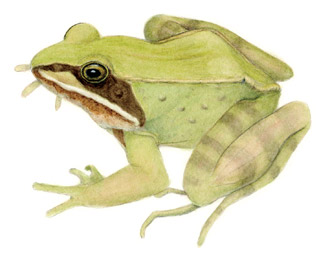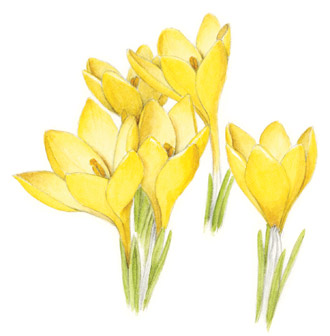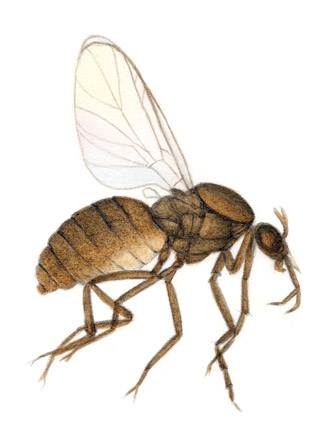
Illustration by Sam Manning.
—George Bernard Shaw
Dear Friends:
Sunrise is getting earlier and sundown later, allowing the sun to do its life-giving work and weary Mainers to remember the nearly forgotten joys of warm days. The ospreys or “fish hawks” have returned to their favorite haunts in time for the alewive’s run. Turkey vultures ride the warm air rising from the ground as the sun brings its welcome heat; they can be recognized by their dark gray color and motionless wings that form a slight dihedral or flattened V shape at an angle to the body. They soar in wide circles, scanning the ground below for carrion. Hope it’s not you.
Some snow can still be found in high and shady places and in the woods. The quacking of wood frogs is heard near vernal pools and in marshy places. Spring peepers are due any day. Have you heard them yet? Spring songs of love.
For the first time in months you can actually catch the sweet aroma of earth in your nostrils. I had almost forgotten the peaceful, physical sensation this soft perfume can create in a body, like the scent of being in your mother’s arms, easing fear and giving comfort to the winter-weary soul. The Earth is awakening. Where recently the ground was hard as stone, now it gives a little to your step, like the soft flesh that it is, as the ice retreats northward where it belongs. After so many months of deathly sleep, it is stunning how fast the Earth springs back to life.
Other Signs of Spring
One Thursday morning about this time last year they were shoveling snow off the Academy tennis courts, and by afternoon the laughter of volleying youth could be heard. Crocuses opened and day lilies pushed up by the back door. And of course, town meetings were under way.
Town meeting is one of the oldest and simplest forms of government in New England, serving us perfectly well long before any higher, more elaborate government was in place. Thomas Paine observed on his arrival in America: “I was struck with the order and decorum with which everything was conducted, and impressed with the idea, that a little more than what society naturally performed, was all the government that was necessary, and that monarchy and aristocracy were frauds and impositions upon mankind.” (
Age of Reason, 1794).

Illustrations by Candice Hutchinson [3].
From journalist Elmer Davis (1890-1958): “This nation will remain the land of the free only so long as it is the home of the brave.”
Field and forest report, mid April
Apple trees are at the silver tip phase as their buds begin to swell. Last chance to finish your pruning and apply your dormant oil spray. Lilac buds are showing some green. Fuzzy catkins are dangling on aspen (or “popple” as it’s called around here) and the delicate red flowers of red maples are beginning to show. Finches are starting to sport their bright colors and are mingling with returning white-throated sparrows around the bird feeder. The first honeybees are active. All in all, we’re enjoying the Maine “April Vacation,” when the air is warm enough for us to be outdoors and the wretched blackflies are still unaware.
Saltwater report
The Rockweed Wars around Cobscook Bay continue. Some feel that harvesting rockweed damages the nurseries of periwinkles, clams, and certain fish, and that the floating rockweed left behind fouls propellers. Others feel that rockweed can provide an important local resource and can be taken sustainably. If this harvest is to be done correctly, it must be monitored by all parties. The Maine Department of Marine Resources is sorely understaffed already, so it’s up to the locals to work this out together peacefully. Let local resources be managed locally.
Natural events, late April
The waters run all over. Brooks and streams rush, puddles and rivulets appear where none have been, ducks quack in the ditches and driveways. It is whitewater season on Maine’s rivers and streams, the destination of many a paddler’s pilgrimage.
Testing oneself against a racing, roaring river is good practice for living life. Like time, the river goes only forward. One is carried by the current and must be ready to make quick decisions by watching the movement of water against rocks and boulders right ahead. The rapids and riffles must be read now; as there is little time for pondering. Hesitation or misjudgment can lead to a sudden cold bath, or worse. Sometimes one must choose between the lesser of two evils, but there is a transcendent and unspeakable exhilaration in giving oneself up to being carried by the currents of the river.
I’ve paddled the Union and Machias Rivers, Kenduskeag Stream, Blue Hill Falls, and Cobscook Falls. I’ve been baptized and I’ve been saved; I’ve won and I’ve lost; and I don’t regret any of it. I dream about it night and day. While I don’t do whitewater any more, the lessons I learned are scribed on my soul: Keep your essentials in a dry bag, hold onto your boat even if you are thrown overboard, go with the flow, and don’t think too much.
Saltwater report, late April
These days we also launch our human-powered craft into salt water, as the inhabitants of this coast have done for thousands of years. Artifacts of the 6,000-year-old Red Paint culture appear from New Jersey to Norway indicating trans-Atlantic ocean travel millennia before the Vikings or Columbus ever set to sea. Archaeological digs in downeast Maine have revealed plummets and harpoons, and the bones of dolphin and swordfish, that are indications of long-ago deep-water fishing. Seafaring craft and skin-covered boats do not survive the acidic soils, but I have old Wabanaki designs that show great waves, four-man boats, and sea creatures as big as the boats. I’ve painted these designs on my kayaks and would be glad to share them with you. Might be good medicine.
Rank Opinion
We came up from the sea and we go down to the sea, but unless industrial fishing and whaling are controlled and we stop using the ocean for a toxic dump, the womb of life on earth may become its tomb.
Natural events, early May
As the warm May days come along, so do our six-legged relatives that have been dormant or over-wintering as eggs. Most insects need temperatures in the mid-60s to come alive.
The mayfly is the adult of several species of the order
Ephemeroptera, related to dragonflies and damselflies. The adults of some mayflies live for only a matter of days or hours, and clouds of them can be seen over streams and rivers, causing feeding frenzies of fish. Bumblebees, genus Bomba, and honeybees, Apis mellifera, nuzzle the flowers of red maples and dandelions.
May is also the month of the blackfly, genus
Simulium—Maine’s symbol and protector—emerging around May Day and starting to bite around Mother’s Day in these parts. Blackflies are related to mosquitoes, also arriving now. Like the
Ephemeroptera, they lay their eggs in water and their larvae and pupae are aquatic, the adults emerging from the water in due time. And of course, moths and butterflies, order Lepidoptera, including the larvae of the tent caterpillar and the adults of the mourning cloak butterfly, are also appearing in the fields and forests. All creatures great and small are animated by the growing warmth of the sun as they welcome the month of May. And that is probably more than you wanted to know about these critters.
Field and forest report, early May
In the fields, violets and bluets are brightening the new green grass with their delicate and precious blossoms. The gorgeous red and orange flowers of the red maples are falling, and the glowing green buds of the Norway maple are opening to reveal their long-stemmed green flowers. Pears and wild cherries are coming into bloom, and apples are showing some green.
Another seedpod to carry around with you
From Margaret Atwood: “In the spring, at the end of the day, you should smell like dirt.”
Natural Events, Mid May
The fierce maternal instinct of bears is proven in science and story. A sow bear with cubs to defend is a formidable creature, to be avoided in the wild at all costs. You’ve probably heard the story about the two men who were charged by a mother bear. One stopped to put on running shoes. The other shouted, “You’ll never outrun that bear!” The first shouted back, “I only have to outrun you!”
There was a story in the
Bangor Daily News some years ago of a mother bear taking in a wandering beagle pup and lavishing it with motherly affection until its owner found them and with some difficulty removed the pup from the bear’s den. It is my experience that humans are much the same. Mothers will go to extreme lengths of labor and self-sacrifice to protect the welfare of children. Unfortunately, in both species the paternal instinct is rarely so strong. Single mothers vastly outnumber single fathers. Female teachers, nurses, social workers, and caregivers greatly outnumber men. The human maternal instinct to protect the young from danger can be bear-like in its ferocity. But where is Poppa Bear?
Yet another seedpod to carry around with you
A Spanish proverb: “An ounce of mother is worth a pound of priests.”
Natural events, continued
I have a beloved old wheelbarrow bought for $10 at a yard sale over at the Legion Hall many years ago. How do I love it? Let me recount the ways:
It has a state-of-the-art hybrid propulsion system that uses bio-dynamic power on up-grades and kinetic gravitational power on down-grades. No fossil fuel is required—just one old fossil to push—and no toxic emissions other than when I groan or curse or worse. My wheelbarrow starts on the coldest mornings, never runs out of gas, and, other than the little three-note tune it sings as its steel wheel turns, is utterly silent in operation. It has only one moving part, the wheel, which can roll 10,000 miles with no noticeable wear. The wooden handles are decorated with ornamental carvings created several years ago by a red squirrel that had a taste for the salt of human hands and gnawed the wood into wondrous and curious shapes.
This marvelous cart has been left out in the weather for as long as I have had it. This ordeal appears not to have damaged it, but rather toughened and preserved it under a protective layer of dark red iron oxide and gray weathered wood.
When I lift those old handles I remember my 18th summer in 1962, when I worked as a mason-tender near Eagle River, Wisconsin, and watched a black bear cub run up a power pole not 100 feet from where I sat eating my lunch. On that job I learned how to operate a wheelbarrow the hard way, by running full loads of mortar or bricks up a ramp and along a series of single planks 30 feet above the ground to keep the masons supplied. You keep your arms and back straight, and lift with your legs. You toe out and keep your feet as far apart as possible to balance the load. When you tip up the wheelbarrow to dump, you put your right foot behind the wheel to keep it from rolling back on you.
Rank opinion
For ages the greatest works of human civilization—the pyramids of Egypt, the roads of Rome, the great wall of China, Machu Picchu, the cathedrals of Europe, the Erie Canal, and the production of all the housing and food necessary to support these monumental efforts—were done with muscle power, human and animal, dependent on nothing but renewable resources: sun, water, and grain. It seems today that every job, no matter how small, is dependent on plundered petroleum and the infernal combustion engine. We are very near to forgetting how to create great works with only our own bodies, and now we hear that the oil is running out. Love your shovel, your handsaw, your wheelbarrow, and your neighbor today; you will need them tomorrow.
Mountain report, mid May
Breathtakingly beautiful blue violets, white dog-tooth violets, and bluets are blooming in the lower meadows. On the higher slopes, leaves of Canada mayflower are opening to show their tiny clusters of green buds like miniature lilies-of-the-valley. Bunchberry leaves and green buds are emerging. A bald eagle circles around the summit of Awanadjo—Blue Hill, “small misty mountain” in Algonkian—signaling a release of human domination and a return of the mountain to its natural and wild state.
Natural and un-natural events, late May
The town is busy with the labors of homeowners planting, painting, and sprucing up the grounds for the summer season. Tradesmen are bustling about readying summer homes for the arrival of their owners over the Memorial Day weekend. Every year there are new and larger homes where old summer houses used to be. Robins are nesting in the garage and chipmunks are scurrying to the woodpile with cheeks full of sunflower seeds from the bird feeder. The long idle months of winter are swept away by the frantic frenzies of impending summer.
Last year, to escape the hustle and bustle, your commentator paddled out to Twin Oaks Island in the harbor for some peace and quiet. Peace there was for a few moments, as I sat in the sun on the huge sandy mound in the center of the island with two oak trees growing out of it, but I was soon crawling with enough ants to make me wonder if this was one big ant hill. It was not all that quiet either. Parker Point roared with the sounds of mowers, weed-whackers, and wood chippers mutilating unwanted vegetation. I couldn’t help but think what would happen of we had a Society for the Prevention of Cruelty to Plants. They’d be up in arms at the massive brutality we visit on the vegetative kingdom.
Field and forest report, late May
The wonders of the plant kingdom are displayed in blooming apples, pears, plums, cherries, strawberries, and blueberries that fill the air with fragrance and attract bees from far and wide, bringing pollen to fertilize the fruit we will enjoy as the summer progresses. Petals fall in showers as vernal ovaries swell and grow to protect and nourish the living seeds within. Orchards are garlanded with glory, and the barrens are going from green and gold to white as a million acres of blueberry bushes come into bloom and honey bees hurry to kiss each blossom.
And a final seedpod to carry around with you
From John Muir: “They tell us that plants are perishable, soulless creatures, that only man is immortal, but this, I think, is something that we know very nearly nothing about.”
That’s the almanack for this time. But don’t take it from us—we’re no experts. Go out and see for yourself.
Yr. mst. hmble & obd’nt servant,
Rob McCall
Rob McCall is the minister of the First Congregational Church, Blue Hill, Maine. This almanack is excerpted from transcripts of his weekly radio show, which can be heard on WERU, 89.9 FM Blue Hill and 102.9 FM Bangor, and streamed live via
www.weru.org. Readers can contact him directly via e-mail:
awanadjoalmanack@gmail.com.
 Illustration by Sam Manning.
Illustration by Sam Manning. Illustrations by Candice Hutchinson [3].
Illustrations by Candice Hutchinson [3].








